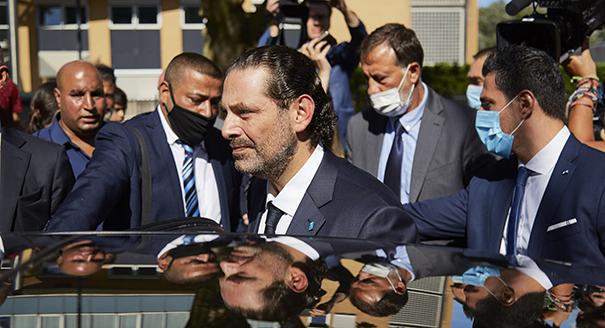What Happened?
Saad al-Hariri, Lebanon’s former prime minister, has announced that he would suspend all his political activities and would not be a candidate in the country’s parliamentary elections next May, nor would he sponsor a list of candidates.
The statement had been expected, but in many regards what was not said may end up being more important than what was. With Hariri out of the running, and another former prime minister, Tammam Salam, also announcing that he would not stand for elections, the question is whether two other present and former prime ministers, Najib Mikati and Fouad al-Sanioura, can participate. And if they decide to follow Hariri’s lead, might second-tier Sunni candidates do the same? Could Lebanon find itself in the midst of an undeclared Sunni boycott of political life, one primarily directed against Hezbollah?
Why Is It Important?
Hariri’s decision was much more than a simple statement of nonparticipation. His remarks were, effectively, a foretelling of his own political death, albeit one that may conceivably end with a resurrection. It comes against a backdrop of tensions between Hariri and the present leadership in Saudi Arabia. Previously, the Saudis were the Hariri family’s political patrons, until things fell apart following Hariri’s detention in the kingdom in 2017.
On several occasions since that time, there were signs that Riyadh was unhappy with Hariri, particularly his willingness to reach a modus vivendi with Hezbollah. The Saudis were said to strongly oppose Hariri’s last two efforts to form a government—in 2019 and again in 2020–2021. Last July, after nine months of trying without success, he threw in the towel. Many observers at the time concluded that Hariri’s hard line with President Michel Aoun was intended to persuade Riyadh that he could be tough with Hezbollah and its allies, but in the end it was he who had to admit political defeat.
The announcement also came amid reports that Hariri, who is currently based in the United Arab Emirates, was told by the Emiratis that he would be allowed to conduct his business affairs in the UAE, on condition that he withdrew from politics, at least for the time being. It appears that the Emiratis wanted to avoid upsetting the Saudis. Moreover, Hariri has limited funds to finance an election campaign. His Saudi Oger company went bankrupt in 2016, leaving thousands of employees unpaid, and some of Hariri’s principal funders, including businessman Jihad al-Arab, left Lebanon last year.
What is most striking in Hariri’s decision is the fact that he bowed to a Saudi preference based largely on personal antagonism. The ties between Hariri and the kingdom’s effective ruler, Crown Prince Mohammed bin Salman, have been poor. While Hariri’s record is open to question, the Saudis’ personalization of their approach to Lebanon may backfire and further harm the kingdom’s interests.
What Are the Implications for the Future?
By announcing that he would no longer participate in politics and parliamentary elections, Hariri has denied Lebanese Sunnis their dominant communal representative. There is much uneasiness among many Sunnis, not to mention Hariri’s political allies, about the political vacuum that will ensue within the community. Many of those allies—notably the Druze leader Walid Joumblatt—will scramble to mobilize sympathetic Sunni voters in those constituencies where Sunnis have the numbers to affect electoral outcomes.
Because of Hariri’s exit, there is now a far greater possibility that Sunni voters will either be demobilized or will see their votes fragmented. This could create openings for Hariri’s political rivals—notably Hezbollah and the Aounists—to gain more seats. To avoid this, members of the Future Movement may try to maintain their organization’s internal coherence by running candidate lists around the country that are not officially supported by Hariri or Future, but that the former prime minister would have favored.
Hariri’s abandonment is also another major chapter in the Saudi decision to disengage from Lebanon, even though the wisdom of this is debatable. Few people may give Hariri high marks for political foresight, but it seems odd that the kingdom has so readily surrendered its strongest card in Lebanon—a large Sunni community that can push back against Hezbollah. Politics is about playing the hand that you are dealt, as Iran has shown in Yemen, and compelling adversaries to compromise. By forcing Hariri out, however, the Saudis have left Lebanon’s Sunnis in a void, which may harden Hezbollah’s and Iran’s conviction that they have no need to compromise.
This past weekend, Kuwait’s foreign minister visited Beirut to present a number of conditions that Lebanon had to meet in order to normalize its relations with the Gulf states. These read as an ultimatum of sorts, if only because the Lebanese political class will find it almost impossible to persuade Hezbollah to abide by them. The visit appeared to show, not for the first time, that the Gulf states are now aligning with the tougher Saudi stance on Lebanon. This suggests that the country is heading toward greater Arab isolation, as it is caught between Saudi Arabia and Iran. At one time Hariri thought he could bridge that gap on the Lebanese scene. His withdrawal from politics shows that, for now at least, that aspiration has failed.
More significantly, if Hariri’s withdrawal spurs a more widespread electoral boycott among leading Sunni candidates, might we be entering a new phase in Lebanese political life? It could be one characterized by a Sunni warning to Hezbollah that for as long as it advances Iran’s agenda at the expense of the Sunni Gulf states and refuses to disarm, the party will have to govern without a Sunni partner. Absent Sunni cover, and with Christian approval fraying rapidly, what would Hezbollah do? In light of this, the prospect that elections will not be held may be more real than ever.









